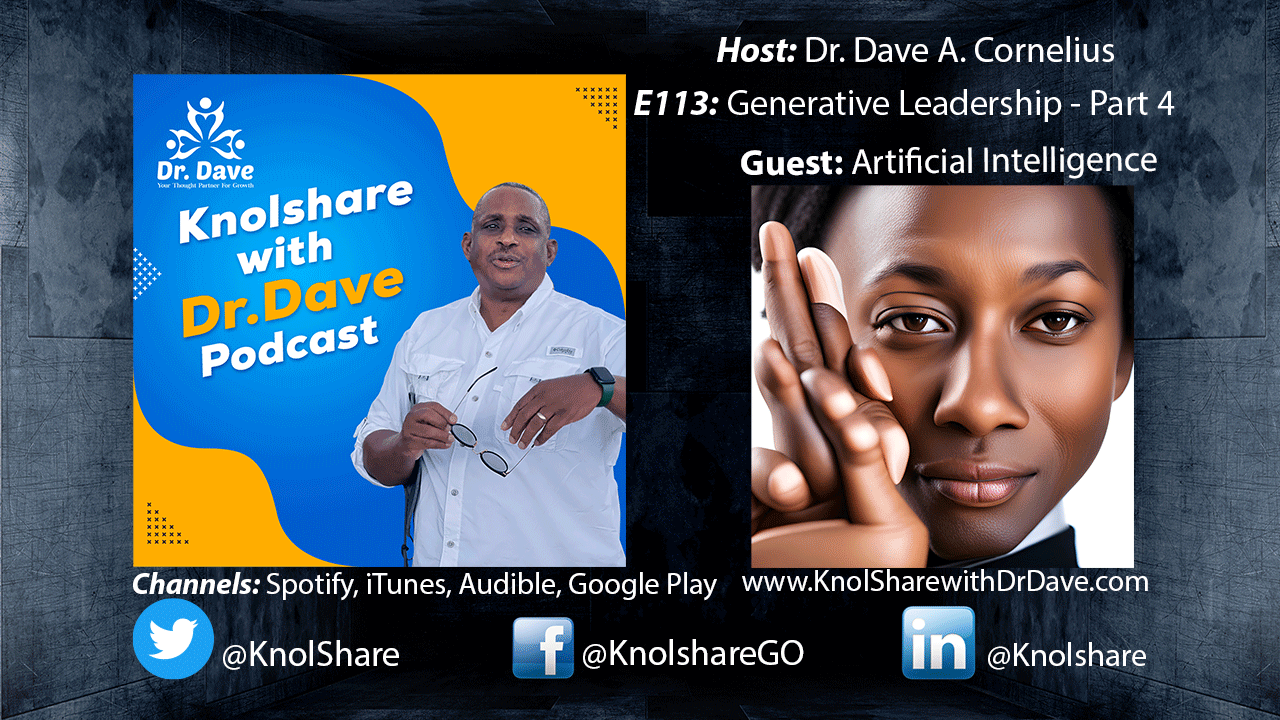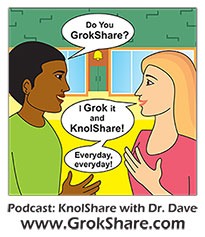E113: Win and Lose as a Team

AI Apps Insights About Win and Lose as a Team
Welcome to another insightful episode of "KnolShare with Dr. Dave Podcast." I'm your host, Dr. Dave Cornelius, and today we're diving into a topic at the heart of effective leadership and team dynamics - 'Win and Lose as a Team.' In a world where collaboration is paramount, embracing this mindset can make all the difference in a team's success.
In any organization, successes and failures are inevitable. The key lies in how we approach them. As generative leaders, we must foster a mindset that values victories and setbacks as collective experiences that shape our journey.
The 'win and lose as a team' mindset emphasizes that individual achievements are intricately linked to the overall team performance. When we celebrate a team member's success, we celebrate our shared efforts. And when we learn from a misstep, we grow together, becoming more robust and resilient.
So, why is this mindset crucial for generative leaders? It's because it lays the foundation for a culture of collaboration, mutual support, and shared accountability. When team members genuinely grasp that their actions impact the team's trajectory, it creates a sense of ownership that drives everyone to contribute their best.
But it's not just about pointing fingers when things go awry. It's about acknowledging that setbacks are part of the journey and that we can overcome them collectively. When a project doesn't go as planned, it's not a 'loss'; it's a chance to reflect, learn, and pivot together.
Embracing the 'win and lose as a team' mindset encourages open communication. It's about fostering an environment where team members feel comfortable sharing their successes and challenges. This transparency leads to better problem-solving and the opportunity to learn from diverse perspectives.
Imagine a scenario where each team member celebrates their peers' accomplishments without envy, knowing their success adds to their overall achievement. It's a powerful concept that nurtures unity, trust, and collaboration.
The Story of the 1980 U.S. Olympic Hockey Team
Dr. Dave: When you talk about sports, leadership, and the mantra 'Win and lose as a team,' one story stands tall and has resonated with generations - the Miracle on Ice, the 1980 U.S. Olympic Hockey Team.
The Cold War was at its height, and in the world of ice hockey, the Soviet Union was unmatched. They had won the gold medal in the last four Olympics and were heavily favored to win again in Lake Placid. Conversely, the U.S. team was young, inexperienced, made up of college players, and ranked as underdogs.
But the U.S. team had something special: their coach, Herb Brooks. He recognized the need for a new approach to stand a chance against the Soviets. Rather than assembling a group of star players, Brooks looked for players who would complement each other. His famous quote, 'I’m not looking for the best players; I’m looking for the right ones,' is a testament to this philosophy.
Brooks’s rigorous training sessions were legendary, pushing the players to their limits. There were moments of tension, exhaustion, and doubt. But Brooks wasn't just training them physically; he was building a unit, a single entity that would play together, believe together, and, if necessary, lose together.
The climax came when the U.S. team met the Soviet Union in the medal round. The Soviets were leading as expected. But the U.S. team, with their relentless spirit and synergy, managed a comeback, eventually winning 4-3. Al Michaels, the sportscaster for the game, famously exclaimed, 'Do you believe in miracles? YES!' Two days later, the U.S. team went on to win the gold medal by defeating Finland.
This was more than just a win in a hockey match. It was a testament to the power of unity, leadership, and shared belief. Herb Brooks didn’t have the best players, but he created the best team.
The 1980 U.S. Olympic Hockey Team's journey perfectly embodies 'Win and lose as a team.' It’s a lesson for every leader, every organization, and every team. Success isn't just about individual prowess; it's about creating a culture where everyone feels part of something bigger, each member complements the other, and the team's collective belief can overcome even the most impossible odds.
As you navigate your leadership journey, remember the Miracle on Ice. It's not just about assembling stars.
As generative leaders, we need to lead by example. Acknowledging individual achievements within the team and our commitment to learning from failures sets the tone. Demonstrating this mindset inspires our team members to do the same, creating a ripple effect that transforms the entire organization.
But how do we practically implement the 'win and lose as a team' mindset? It starts with clear communication. Encourage team members to share their experiences, both positive and negative, openly. The team's growth is a collective effort, and learning from challenges benefits everyone.
Remember, it's not just about the outcomes; it's about the journey. The setbacks we face are opportunities for growth and improvement. Embracing them together sets the stage for even more significant successes.
Let's approach it as a team, whether it is a triumphant victory or a learning opportunity. Let's celebrate each other's achievements and stand together when we stumble. After all, the essence of the 'win and lose as a team' mindset lies in our commitment to one another's growth and our collective success through unity.
An interesting question -- Something to Ponder.
Your team is participating in an intergalactic soccer tournament where the gravity changes every few minutes. How would you strategize to win, and if you lose, how would you handle the loss as a team?
Thank you for joining me on this episode of "KnolShare with Dr. Dave Podcast." Remember, as generative leaders, our journey is about nurturing a culture of collaboration, mutual support, and shared accountability. Embrace the 'win and lose as a team' mindset, and watch as it transforms your team and the entire organization.
Until next time, keep leading generatively and empowering your teams to thrive.
Podcast (ks_dd): Play in new window | Download (12.3MB) | Embed
Subscribe: Apple Podcasts | Email | RSS
